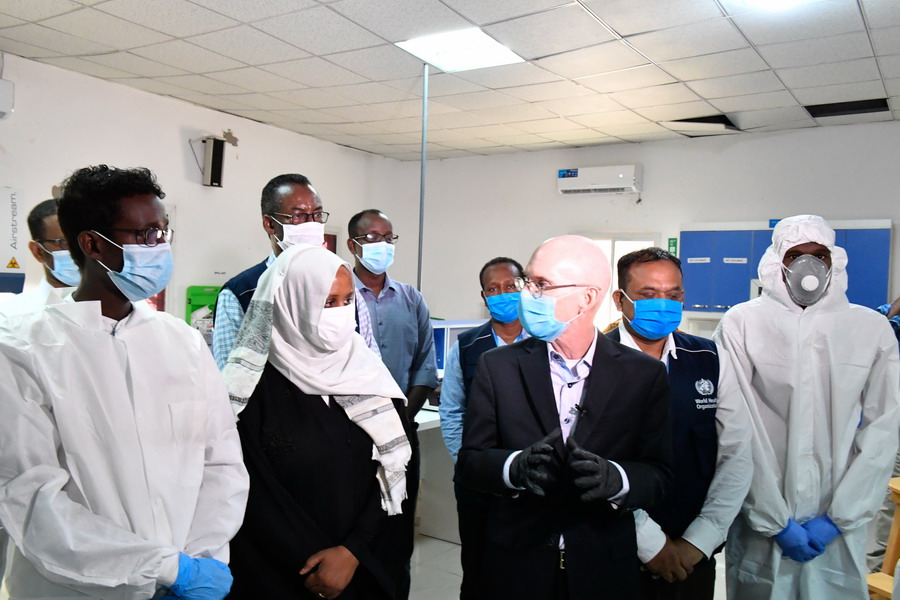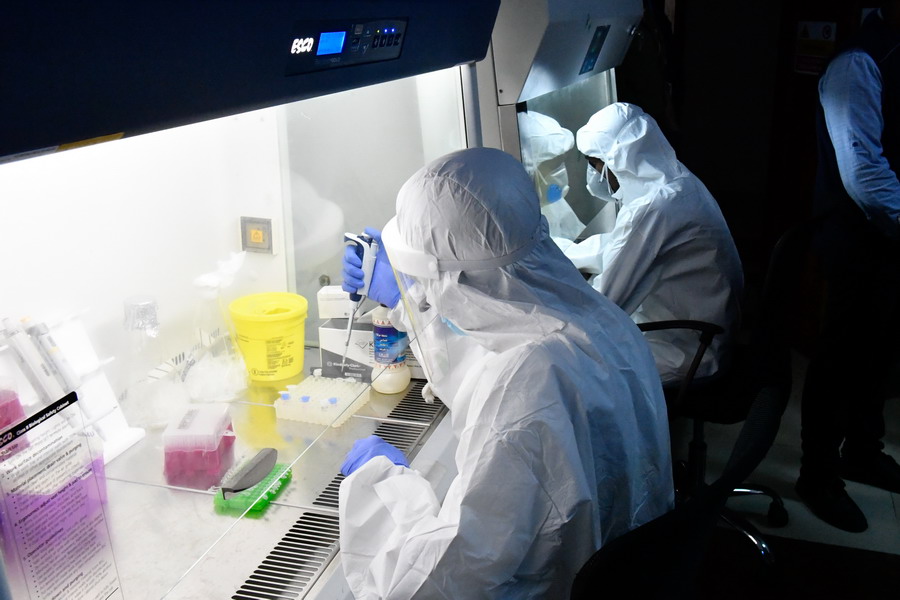13 July 2020 – “I had heard of diseases like Ebola before but thankfully they had never reached Somalia. When the COVID-19 pandemic struck countries around the world this year, my heart sank. When I saw how quickly COVID-19 was spreading, I thought Somalis would be in trouble. Other countries were beginning to go into lockdown everywhere and we had no capacity or skills to test patients for the virus,” says Dr Sahra Isse Mohamed, Director of the National Public Health Reference Laboratory. “But we were pleasantly surprised — within a record time of 3 weeks since the first case was reported, WHO, along with international and national partners, such as Medipark Diagnostics, a private laboratory in Mogadishu, teamed up with us to ensure that we built our own capacity to test for the virus.”
 Dr Sahra Isse Mohamed, Director of the National Public Health Reference Laboratory in Mogadishu, introduces UN officials to laboratory personnel and shows them testing facilities. UN Photo/Steven Candia
Dr Sahra Isse Mohamed, Director of the National Public Health Reference Laboratory in Mogadishu, introduces UN officials to laboratory personnel and shows them testing facilities. UN Photo/Steven Candia
Strengthening laboratory capacity
On 16 March 2020, after a Somali doctor, who returned from China, was confirmed as ‘patient zero’ or the first person to be confirmed with COVID-19 in Somalia, WHO and key international partners took swift, bold steps to upgrade Somalia’s diagnostic capacity. While a swab sample from patient zero was sent to the Kenya Medical Research Institute (KEMRI) in Kenya for testing, concurrently, WHO, with funding support from the Italian Agency for Development Cooperation, supported Somalia’s Ministry of Health to procure the real-time reverse transcription polymerase chain reaction (rRT-PCR) machine to test for COVID-19 samples at the National Public Health Reference Laboratory in Mogadishu. WHO purchased 2 similar machines to set up 2 additional testing laboratories for COVID-19 — one in Hargeisa, Somaliland, and the other one in Garowe, Puntland.
WHO has further expanded the testing capability of these 3 laboratories by automating the process of viral ribonucleic acid (RNA) extraction, a vital step in testing before the virus is detected in a biological sample. Considered the ‘gold standard’ for testing of COVID-19 samples, these 3 laboratories currently have the capacity to test over 1200 samples a day. One machine of this kind can test around 360 samples a day, which can be increased if required. Such molecular testing laboratories perform under a strict biosafety level (biosafety level-2), which necessitated WHO to procure the required laboratory equipment to maintain strict biosafety levels.
WHO is also providing budgetary support for hiring additional laboratory technologists to keep these laboratories functional and for operational costs and providing other consumable supplies on a regular basis to ramp up testing. In addition, 2 international virologists have been deployed for the testing laboratory in Hargeisa, Somaliland, since April this year to oversee the effective functioning of the laboratory.
WHO has trained laboratory technicians to conduct COVID-19 tests, with a focus on maintaining high standards. The Organization provided protective gear, testing kits and other laboratory supplies for the laboratory personnel working in these laboratories.
 Laboratory technicians running tests at the National Public Health Reference Laboratory in Mogadishu. UN Photo/Steven Candia
Laboratory technicians running tests at the National Public Health Reference Laboratory in Mogadishu. UN Photo/Steven Candia
“In the beginning, our laboratory staff were rushing out to test people from the community,” said Dr Sahra, “Now, trained personnel from WHO and the Ministry of Health are collecting samples from people presenting with COVID-19 symptoms and their contacts. WHO also provides support by storing samples in coldchains, in the right conditions, and sending them to any of the 3 laboratories nearby. This has really helped us, as we can focus on quality testing and training our staff.
We are now able to test for COVID-19 and other diseases ourselves, and are hoping we can keep expanding the laboratory network from 3 nationwide to one laboratory in every state, to reach more Somalis. Even though we have really been encouraged by the support we have received so far, we can still do more to fight diseases in the country,” added Dr Sahra. “It was a dream for us to have a PCR laboratory and we achieved this. We can now strive to receive international accreditation.”
Acknowledging the role of laboratories and personnel
In their efforts to show support to Somali health workers and the ongoing response to COVID-19 in Somalia, the WHO Somalia Representative Dr Mamunur Malik and the UN Secretary-General’s Special Representative for Somalia Mr James Swan visited the National Public Health Reference Laboratory in Mogadishu on 29 June 2020. They met with laboratory personnel and commended them for their dedication, hard work and professionalism in the response to the ongoing pandemic.
“Well-equipped, well-functioning laboratories are key building blocks for any health system and disease surveillance system,” said Dr Malik. “Thanks to the timely support of donors and partners, Somalia has been able to step up efforts to diagnose COVID-19 and assist people who are infected. The building of such in-country testing capability, rapidly, has helped us to monitor and track the virus spread in the community. We will continue to support these laboratories even further to build their capability to test, diagnose and respond to other infectious diseases, including all high-threat pathogens, using the same molecular testing facilities that we have supported in these 3 laboratories. We also take this opportunity to continue to express our gratitude to Somalia’s health professionals for working selflessly to protect Somalis.”
Somali women playing a key role
Explaining how difficult it has been for her to work under pressure in the last 4 months, Dr Sahra added with a smile, “I am happy to say that half of our team consists of qualified Somali women. Besides, even our Minister of Health, who is in charge of health in the country, is a lady.”
As of 11 July 2020, Somalia had 3051 confirmed COVID-19 cases; 1264 people have recovered from COVID-19, and 92 Somalis have lost their lives to the newly discovered virus.
Note
The following agencies and donors have provided support to the National Public Health Reference Laboratory: the Italian Agency for Development Cooperation (AICS), Medipark Diagnostics Laboratory, UN Development Programme (UNDP), UN Support Office for Somalia (UNSOS), UN World Food Programme (WFP) and US Agency for International Development (USAID).








